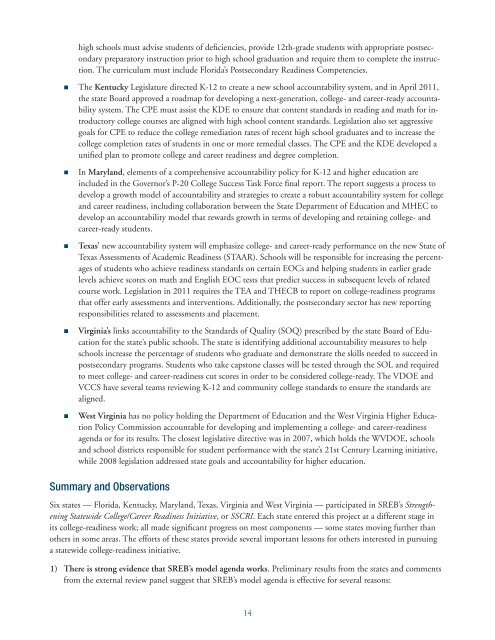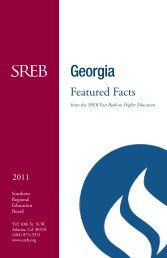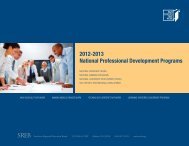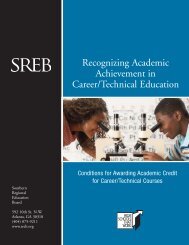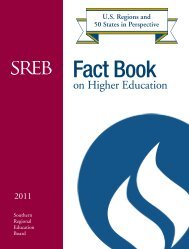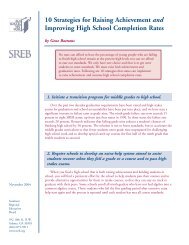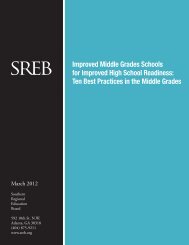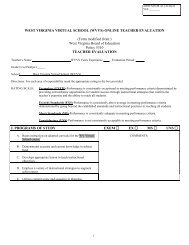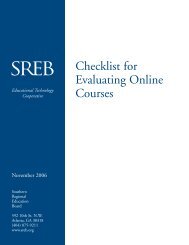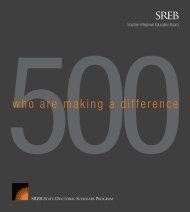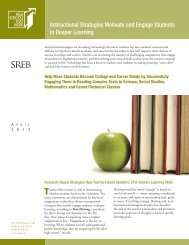Final Progress Reports - Southern Regional Education Board
Final Progress Reports - Southern Regional Education Board
Final Progress Reports - Southern Regional Education Board
Create successful ePaper yourself
Turn your PDF publications into a flip-book with our unique Google optimized e-Paper software.
high schools must advise students of deficiencies, provide 12th-grade students with appropriate postsecondary<br />
preparatory instruction prior to high school graduation and require them to complete the instruction.<br />
The curriculum must include Florida’s Postsecondary Readiness Competencies.<br />
The Kentucky Legislature directed K-12 to create a new school accountability system, and in April 2011,<br />
the state <strong>Board</strong> approved a roadmap for developing a next-generation, college- and career-ready accountability<br />
system. The CPE must assist the KDE to ensure that content standards in reading and math for introductory<br />
college courses are aligned with high school content standards. Legislation also set aggressive<br />
goals for CPE to reduce the college remediation rates of recent high school graduates and to increase the<br />
college completion rates of students in one or more remedial classes. The CPE and the KDE developed a<br />
unified plan to promote college and career readiness and degree completion.<br />
In Maryland, elements of a comprehensive accountability policy for K-12 and higher education are<br />
included in the Governor’s P-20 College Success Task Force final report. The report suggests a process to<br />
develop a growth model of accountability and strategies to create a robust accountability system for college<br />
and career readiness, including collaboration between the State Department of <strong>Education</strong> and MHEC to<br />
develop an accountability model that rewards growth in terms of developing and retaining college- and<br />
career-ready students.<br />
Texas’ new accountability system will emphasize college- and career-ready performance on the new State of<br />
Texas Assessments of Academic Readiness (STAAR). Schools will be responsible for increasing the percentages<br />
of students who achieve readiness standards on certain EOCs and helping students in earlier grade<br />
levels achieve scores on math and English EOC tests that predict success in subsequent levels of related<br />
course work. Legislation in 2011 requires the TEA and THECB to report on college-readiness programs<br />
that offer early assessments and interventions. Additionally, the postsecondary sector has new reporting<br />
responsibilities related to assessments and placement.<br />
Virginia’s links accountability to the Standards of Quality (SOQ) prescribed by the state <strong>Board</strong> of <strong>Education</strong><br />
for the state’s public schools. The state is identifying additional accountability measures to help<br />
schools increase the percentage of students who graduate and demonstrate the skills needed to succeed in<br />
postsecondary programs. Students who take capstone classes will be tested through the SOL and required<br />
to meet college- and career-readiness cut scores in order to be considered college-ready. The VDOE and<br />
VCCS have several teams reviewing K-12 and community college standards to ensure the standards are<br />
aligned.<br />
West Virginia has no policy holding the Department of <strong>Education</strong> and the West Virginia Higher <strong>Education</strong><br />
Policy Commission accountable for developing and implementing a college- and career-readiness<br />
agenda or for its results. The closest legislative directive was in 2007, which holds the WVDOE, schools<br />
and school districts responsible for student performance with the state’s 21st Century Learning initiative,<br />
while 2008 legislation addressed state goals and accountability for higher education.<br />
Summary and Observations<br />
Six states — Florida, Kentucky, Maryland, Texas, Virginia and West Virginia — participated in SREB’s Strengthening<br />
Statewide College/Career Readiness Initiative, or SSCRI. Each state entered this project at a different stage in<br />
its college-readiness work; all made significant progress on most components — some states moving further than<br />
others in some areas. The efforts of these states provide several important lessons for others interested in pursuing<br />
a statewide college-readiness initiative.<br />
1) There is strong evidence that SREB’s model agenda works. Preliminary results from the states and comments<br />
from the external review panel suggest that SREB’s model agenda is effective for several reasons:<br />
14


